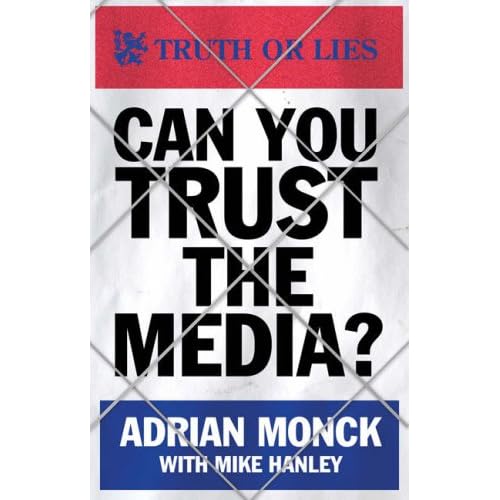
When you're a tiny hermit crab in the media rock pool it's sometimes hard to grasp the bigger debate. Why are we in this pool anyway? Why does that starfish look so different from me, a little hermit crab? How long will this pool last anyway, and is that rushing sound the tide coming in? That's why it's good to have books like Adrian Monck and Mike Hanley's 'Can We Trust the Media?'. They help you take your mind off the search for the next piece of plankton.
Back in the day Adrian was a bigger and faster fish in my pool; a producer of Special Reports for News At Ten before I did the job, then off to Five News where he was Managing Editor for some time; now he's at the City University where he lectures in journalism. I flinch to think what he teaches, because his book is no advert for our trade. Instead it is a slick exposition of everything that is wrong with the way the media operates in this country, and in one or two others.
Reading it as one who works in 'the media' I was first slightly ashamed, then appalled. Can we get anything right? It is a catalogue of venal editorial sin, ranging from a brief and effective summary of the Gilligan disaster on the 'Today' programme to the Sun's shameless nonsense about a Great White Shark off Cornwall. Hardly any horrid breach of faith is left undisturbed. Not content with the wickedness of ourselves on this side of the pond the authors even go Stateside to discuss the case of Jayson Blair, who used to make up entire stories for the New York Times. It's all deeply humbling. And in fairness Adrian doesn't spare himself; an incident in which he gave money to joyriders is related and (gleefully) so is another incident in which he stitched up the BNP live on Five News.
No academic dry text this, instead there's lots here to interest and entertain; especially if you like well informed material about how the media operates. A concise account of Silvio Berlusconi's rise to power is accompanied by a quick flashback to ancient Greece, for example. There can't be much wrong with a book which has both Plato and Piers Morgan in the index; the narrative jumps around healthily and has plenty of Zap and Pow.
But the authors' vision is of a media that pretends to be trustworthy in order to somehow cheat people of their attention, and so the book ends up as an analysis which borders on the cynical. "All news involves some form of artifice" they say. (Chapter 5, P91). The expansion of television news has simply "allowed people the convenience of opting out." (P63 in a chapter headed 'Media Bulimia'. You get the picture). It is an unremittingly negative account and if I was to take it to heart I'd never get up in the morning (or work all night, for that matter).
There's a bit missing; the portion where Adrian and his co-author could point the way ahead, to the bright shining uplands of re-establishing a better contract between media producer and consumer. In my opinion the web means that's already well on the way to being negotiated, with bloggers and comment redefining all kinds of coverage in an enormously exciting way. But that isn't here and I'm sure that's a deliberate omission; there is no way ahead in their world view, there can only be more denuding of any authority the media has and a gentle drifting away of audiences and revenue. I don't agree. I think the party's just starting.
1 comment:
But doesn't the blogger world create a whole new set of problems. Take the blog world around the American election. It has created its only reality. So many people have engaged in every tiny moment of the campaign that they are now so stuck in their side's narrative about what is happening that they have become almost cognitively incapable of reception to facts that jar with that narrative. The whole thing becomes more and more emotionally driven and more and more obsessive, neither of which are conducive to our political life getting better. Hats off though to Jay Cost on Real.Clear.Politics who has got himself firmly fixed in the world of factual analysis.
Post a Comment